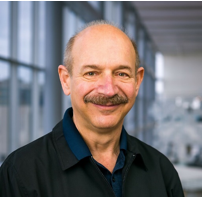https://meditropics.com/bruce-alan-beutler/
*Niraj Nilayan Barua
*Post Graduate Resident, Department of Medicine, LHMC

Bruce Alan Buetler is the recepient of Nobel Prize in Physiology or Medicine 2011 for discoveries concerning the activation of innate immunity.
Childhood– Bruce Beutler was born on December 29, 1951, in Chicago, Illinois. He grew up in a family that encouraged intellectual curiosity. Beutler lived in Southern California between the ages of 2 and 18 (1959 to 1977). His introduction to experimental biology, acquired between the ages of 14 and 18, included work in the laboratory of his father, Ernest Beutler, then at the City of Hope Medical Center in Duarte, CA. There he learned to assay enzymes of red blood cells and became familiar with methods for protein isolation. He published his studies of an electrophoretic variant of glutathione peroxidase as well as the inherent catalytic activity of inorganic selenite at the age of 17.
Education – Bruce Beutler completed his undergraduate education at the University of Chicago. He then went on to the University of California, San Francisco, to pursue his medical degree, receiving his M.D. in 1978. After his medical training, Beutler conducted his residency at the University of California, San Francisco, and later completed a fellowship at the Scripps Research Institute. His strong educational foundation in both biology and medicine laid the groundwork for his groundbreaking research in immunology, ultimately leading to significant discoveries in the field.
Achievements
Bruce Beutler is a distinguished immunologist known for several groundbreaking contributions to the field. Some of his key achievements include:
Nobel Prize in Physiology or Medicine (2011): Beutler was awarded the Nobel Prize for his discoveries concerning the activation of innate immunity, particularly his work on the role of Toll-like receptors (TLRs) in the immune system.
Identification of TLRs: He was pivotal in identifying the first Toll-like receptor, which plays a crucial role in the immune response to infections by recognizing pathogens.
Innate Immunity Research: His work has advanced the field of innate immunity, exploring how the immune system responds to various pathogens and the genetic factors that influence these responses.
Genetic Research: Beutler developed innovative mouse models that helped elucidate the genetic basis of immune responses, including the discovery of mutations that affect immune function.
Contribution to Understanding Sepsis: His research has provided insights into the mechanisms of sepsis and how the immune system responds to bacterial infections.
Publications and Influence: Beutler has authored numerous influential papers in high-impact journals, contributing to the understanding of innate immunity and inflammation.
Leadership Roles: He has held key positions at institutions such as the Scripps Research Institute and the UT Southwestern Medical Center, where he has mentored many researchers and students.
These contributions have had a profound impact on immunology and have helped shape modern approaches to understanding and treating immune-related disorders.
Reference :